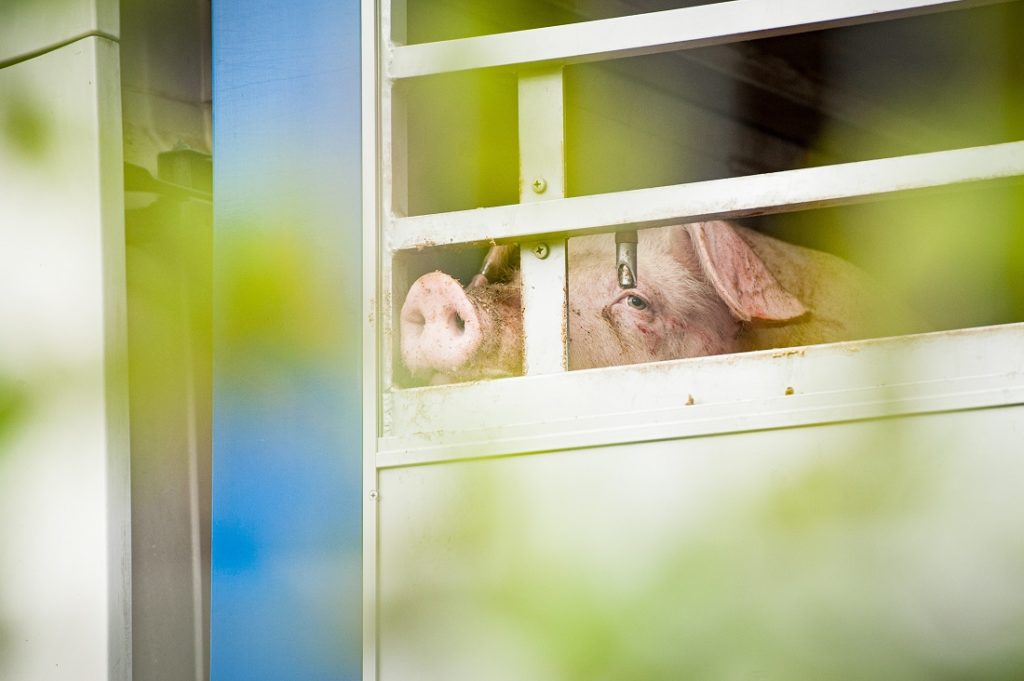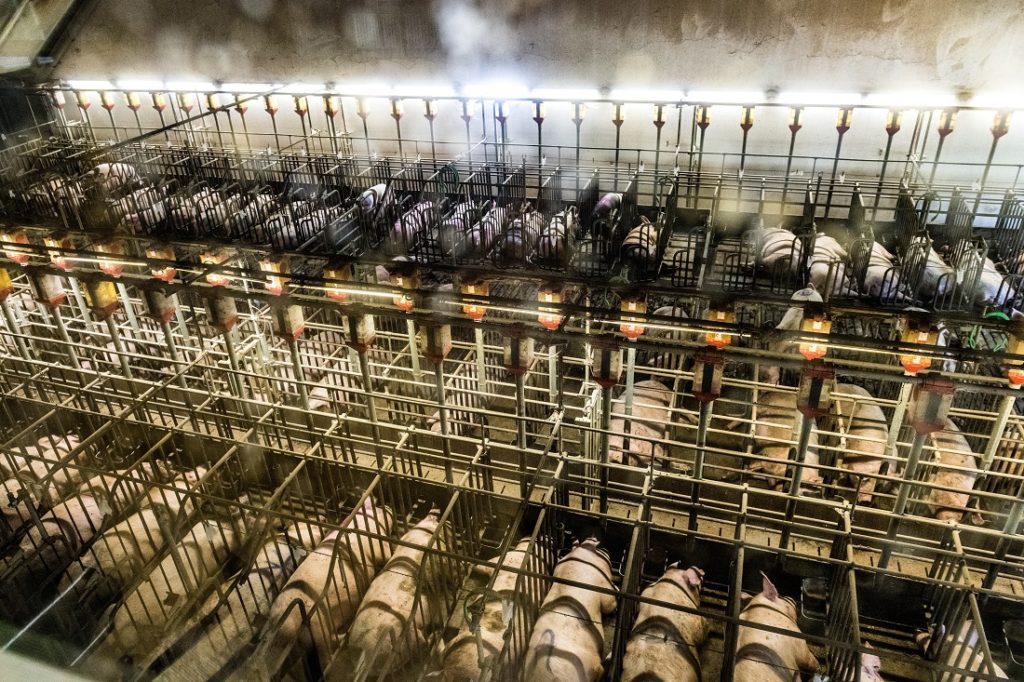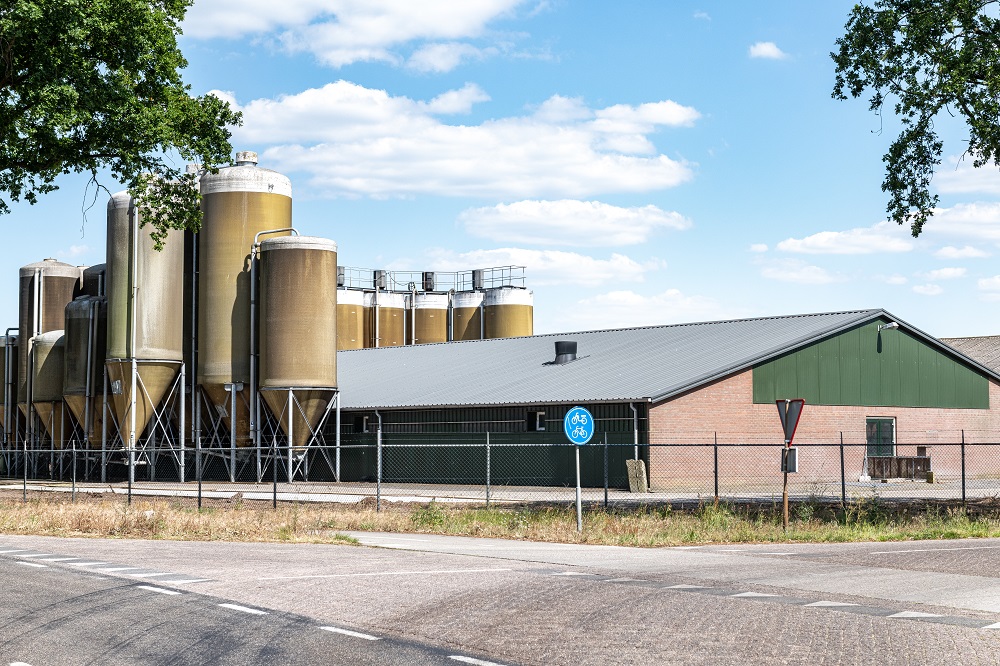Intensive livestock farming in North Brabant: ‘Such a difficult issue, where is Tilburg University?’
Nitrogen crisis, drinking water and soil pollution, health complaints, and odor nuisance. The negative consequences of intensive livestock farming are piling up in North Brabant. Shouldn’t this problem be higher on Tilburg University’s research agenda? A number of researchers think so.

North Brabant is the most livestock-dense province in the Netherlands and the most livestock-dense region in Europe. And that is causing major problems. Due to high nitrogen emissions, biodiversity is rapidly declining. Residents living near large livestock farms often struggle with health complaints, drinking water pollution is increasing, and the risk of new zoonoses is high. And we have not even mentioned the poor working conditions in the meat processing industry.
Although the problems regarding Brabant’s intensive livestock industry are in Tilburg University’s backyard, it is not a visible topic within the university. Let alone that it is a main theme. In the university’s new Strategy Weaving Minds & Characters, sustainability is a recurring topic, but the connection to the agricultural sector is not made. Remarkable for a university whose motto is Understanding Society. And with its specialization in the humanities and social sciences, it could very well contribute to the solution of this problem.
There are individual scholars at Tilburg University who work on this issue or on related topics, such as the environment, climate change, and the sustainability transition. Univers spoke with some of them and asked, among other things, how high on the TiU agenda the livestock issue is. And should the university not be doing more?
“Unfortunately not that high,” suspects Joks Janssen, professor of practice of Widespread Prosperity and researcher of area development at Het PON-TELOS. He has written several articles (in Dutch) on the consequences of intensive livestock farming in Brabant. “In the past, there was more connection between the university and the Brabant farming community and thus with these agricultural issues. For a long time there was even an endowed chair funded by the Christelijke Boerenbond (Christian Farmers’ Association, now the Southern Agricultural and Horticultural Organization (ZLTO), ed.).”
‘In the past, there was more connection between the university and the Brabant farming community’
That connectedness has faded into the background in recent years, according to Janssen. There are researchers looking at different elements of that agricultural issue but not from a more integrated perspective. “It would be a great challenge for Tilburg to do that. To see if we can apply that knowledge and help society tackle this problem.”
Where is Tilburg University?
Carla Koen, professor of technology strategy and entrepreneurship (TIAS) also thinks Tilburg University could play a more visible role in this area. If there is one issue for which the university should do something, she believes, it is the negative impact of intensive livestock farming. “Such a difficult issue in Brabant, where is Tilburg University?” According to Koen, the university can interpret what the problem is, but above all, it can help contribute ideas regarding solutions. She herself did so by participating in the Taskforce Verdienmodellen Kringlooplandbouw (Revenue Models Circular Agriculture) that was established in 2019 by Minister Carola Schouten.
“I have asked myself: can we as a university then be of very little consequence in this area? And then I think: no! Because if anyone can contribute Ideas regarding business models and management, behavioral change, and the psychological and moral component of it all, it is Tilburg University. We may not have ecologists and biologists who can say something about the state of nature, but then again, there are already more than enough of them. Why do you think I was on Carola Schouten’s task force? To investigate the earning power of those farmers. If they have to move towards less livestock, how are they supposed make their own living?”
Based on that same thought, Joks Janssen is in favor of putting a number of Tilburg researchers together to integrate their knowledge. “To really arrive at systemic solutions because that’s what The Hague is also struggling with. People talk about ‘perspective for farmers,’ but what does that look like? How do you win over the farmers and how do you make sure society is able to support it? An extremely interesting issue, which is now being taken up mainly by Wageningen University. It would be great if Tilburg also joins in.”
Science is not always appreciated
Reyer Gerlagh, professor of environmental economics and director of the Tilburg Sustainability Center, wants to qualify the role the university can play in this agricultural issue. “I have been doing research on the energy transition and climate change for 20 years. The scientists were not listened to much during that time, which does not help for motivation.”
Gerlagh is, therefore, less convinced that academics can make a major contribution to solving a societal problem with their research. “Yes, we can make a contribution, but if society is not ready for it, that contribution will also fall short.” To which he later adds, “Many environmental problems do not require new scientific knowledge. We have known for a long time that we need to get rid of fossil fuels and that we need to emit fewer nitrogen compounds. The problems are political, not so much scientific, and scientists are not consultants.”

The consequences of intensive livestock production are at least at the top of the list of Professor of International and European Environmental Law Jonathan Verschuuren (TLS). The agricultural and food transition (from intensive to sustainable agriculture and from a primarily animal to a largely plant-based diet) has been his main research topic for years.
As a legal scholar, he looks at legal instruments that can trigger these transitions, such as air quality, water, and biodiversity legislation. But also instruments that can steer consumers toward more sustainable choices, such as a meat tax.
‘This issue is going to be decisive for the future of the Earth in the coming decades’
“I approach the topic from climate change. But because, within the agricultural sector, livestock farming is by far the most important contributor to climate change, this discussion is closely intertwined with the nitrogen discussion and with all the other discussions about the negative impacts of livestock farming on biodiversity, water, soil and air quality, and public health.”
Should Tilburg University take a larger role in interpreting these issues and looking for solutions? “Yes, I would certainly say so. Not only because this issue is going to be so important and decisive for the future of the earth in the coming decades. But also because this is the biggest environmental issue for the province of Brabant, with an important social component.
“We have many rural municipalities in Brabant; the battle that seems to be going on now between urban and rural, that’s a very big issue. Super important for a university that deals with socially relevant issues.”
Time for an academic collaborative center on sustainable agriculture?
Verschuuren was involved in establishing the Academic Collaborative Center on climate and energy transition. Although the theme of intensive livestock farming and its consequences fits into it, it is not visibly reflected in it.
“It was agreed when the collaborative center was set up to work on energy transition topics first and later on broader climate topics, such as agriculture and food. Simply because you can’t do everything at once and in the area of energy in particular, there were already many concrete contacts.”
The impact of agriculture is so great, according to Verschuuren, that it would easily lend itself as a topic for a separate academic collaborative center. “We know that food demand will continue to rise tremendously, due to population growth and wealth increase. We need to make sure that that demand is met in a new food system. Because if we start producing even more meat for all those people, things will get completely out of hand. This is one of the most important issues of all time. And in a way even more important than the energy transition because it’s so much more complex.”
According to Verschuuren, a successful food transition depends not only on the agricultural sector but also on consumers. They have to start eating different things. That is precisely why it is a subject that belongs at a university specializing in human and social sciences.
‘How do you get a person to abandon their daily meatball?’
“How do you get a person to abandon their daily meatball to be replaced by something plant based? I find that a very exciting topic. You can steer that legally and economically, with pricing instruments. But it also has a lot to do with psychology and sociology, with role models in society, and the influence of social media. And it’s a big public administration theme, we see a separation emerging between farmers and government, between urban and rural. What does that mean for decision-making processes and policies? I think all our Schools can do something with this.”
Towards a sustainable food system
Joks Janssen also believes that you cannot put this problem solely on the farmer. “Look at the total system of agriculture, food production, and consumption. We have to move toward a more sustainable food system, but you can’t do that overnight. I think the university can really help with that, by engaging with citizens and businesses and looking at what the different components of that new system should be.
Researchers can test different components of such a new design. Regarding food and behavioral choices, you can do behavioral experiments, together with supermarkets. The university can also stimulate debate, for example, about the menu of the future, what does it look like and what concession are you willing to make?”
According to Verschuuren, one reason why there is not yet an academic collaborative center on sustainable agriculture or food transition in Tilburg is that there is little guidance from above. “That is the academic freedom. People within a university decide for themselves what they consider important and conduct research on it. Often those initiatives come from the bottom up.”

Janssen recognizes that: “If, within a university, there are a number of people with similar specializations, you can bundle them together. There are a few researchers in Tilburg who are working on these topics, but I think they are still too isolated right now.”
Reyer Gerlagh sees another reason: “There are so many interesting topics. If I give my colleagues a free hand, they can find lots of topics that are potentially more interesting.”
A beautiful ‘rural landscape’
If Tilburg University really cares about sustainability, it should include this topic of intensive livestock farming in its strategy, Carla Koen believes. The university can facilitate that Tilburg researchers with overlapping interests come into contact with each other so that cross-pollination occurs.
“You can let every professor sit in his ivory tower, but then nothing will happen. Research what qualities we already have available, in what departments are they? Is it enough to set up a research agenda? You’ll probably come to the conclusion that you don’t have enough mass yet. Then look at what skills are missing and start looking for people who can fill in the gaps. That’s how it’s done at other universities.”
What ultimately makes or breaks the development of an interdisciplinary research topic is whether a budget is made available for it. On that, the interviewees agree. Jonathan Verschuuren: “The only option is that you reserve money for it, invite people to join in, and free them from other duties. Another option is that you start raising external funding. If you manage to get a big grant you can hire motivated researchers and then things start rolling.”
It is a topic that is alive, at least among the new generation of scientists, Jonathan Verschuuren notices during his lectures. It gives him hope: “This subject, food and meat, is very much alive among students. If I say something about it during lectures, you immediately have a discussion, and it almost seems as if all students are vegetarian or vegan. That was absolutely not the case in the past, you really see a huge difference.”
Meanwhile, area development researcher Joks Janssen hopes that something from that past will return: “In the 1950s, Brabant’s farmland was buzzing with insects and birds. It was a rich and varied cultural landscape with herb-rich grassland, hawthorn hedges, and woodlands along field edges. Very different from today’s monotonous corn fields, meadows of English ryegrass, and large livestock buildings.
“I hope Brabant restores something from that time. Animal- and nature-friendly farming. Many different forms of agriculture, resulting in a beautiful ‘rural landscape.’ That’s my dream.”
What are the consequences of intensive livestock farming in North Brabant?
North Brabant is the most livestock-dense province in the Netherlands and the most livestock-dense region in Europe. There are a lot of farm animals on a relatively small piece of land. About half of all Dutch pigs are in a Brabant barn, nearly 5.5 million. With over 25 million chickens, Brabant is also the leader in this sector; this is a quarter of the total number of chickens in our country. North Brabant also has the most goats: almost two hundred thousand, a quarter of all Dutch goats. Finally, there are a lot of cattle running around in Brabant: almost 600,000, more only in the province of Gelderland.
Many of those farm animals are in huge barns (in Dutch) The Netherlands had 999 huge barns (megastallen) in 2021, most of which (289) are on North Brabant land. Milieudefensie (environmental protection) (in Dutch) calculated that roughly 80 percent of the food produced in this intensive way in Brabant is for export.
Striking numbers (in Dutch), but what are the implications of this livestock density for humans, animals, and the environment?
One of the best known and most discussed consequences of intensive livestock production is the nitrogen problem. In a nutshell, too much nitrogen in nature sours the soil. Many trees, plants, and herbs are not able to take this and disappear. As a result, animals such as bees, insects, and birds also disappear. As a result, the entire biodiversity declines. Agriculture provides about 60% of the nitrogen emissions, through manure, but also from greenhouses and from agricultural vehicles.
Also other problems arise from intensive livestock farming. For example, health problems among people living in the vicinity of livestock farms: such as odor nuisance, respiratory problems due to fine particulate matter, and zoonoses, or infectious diseases that can pass from animals to humans.
Zoonoses, pollution and working conditions
A fairly recent example of such a zoonosis is Q fever, a disease that spilled over from goats and sheep to humans in the Netherlands. The largest Q fever outbreak in the world occurred in the Netherlands between 2007 and 2011. The disease spread through infected goat farms, first in Brabant and later across the country. Thousands of people became ill, nearly 600 people are still struggling with chronic Q fever and 107 people have since died.
Furthermore, there are problems with the drinking water. In 2017, water companies sounded the alarm about the threat to drinking water extraction due to manure. Purification is becoming increasingly expensive and complex. Therefore, in Brabant, several groundwater extraction points for drinking water have been permanently closed in recent years due to pollution by manure.
A relatively unknown problem is poor working conditions (in Dutch) in the meat processing industry. Some 12,000 people work in the meat sector, 90 percent of whom have flexible contracts and earn just above the minimum wage. The vast majority are migrant workers, and they have to deal with poor living conditions.
Not to mention the living conditions of those millions of animals in intensive animal agriculture. The dangers of antibiotic resistance (in Dutch) due to excessive antibiotic use in livestock farming. Or the forests, jungles, and other natural environments that have to make way to grow (in Dutch) food for all those cattle. With the result that the earth is warming up even faster.
Translated by Language Center, Riet Bettonviel






